- Home
- Patricia McLinn
Death on Covert Circle Page 5
Death on Covert Circle Read online
Page 5
Interesting. I hadn’t thought of Rod Birchall as a victim.
Of course he was a murder victim. And I didn’t think he deserved being killed. Not many do in my opinion. On the other hand, my brief observation of him hadn’t engendered tears at his death.
“What’s going on out front, Petey?” Belinda asked.
“Not much. Sorting through the customers. Letting most go. Folks coming in for a prescription or a gallon of milk wouldn’t even know a bigshot was here.”
He could have included toilet paper, cereal, hamburger meat, and rice. All those were located on the left side of the store, opposite from the produce section.
Only that knot of people who’d been drawn into the discussion around Birchall would have been aware of his presence in the store.
What about the customers who had been part of the knot, though, including the woman from the dog park and the teacherish woman? We hadn’t seen either actually leave.
Surely Hensen wasn’t limiting himself to the trio of door-watchers.
The recognition that Birchall’s killer could have entered the back area through any of several doors, widened the field. But, as a practical matter, how much?
Unless the killer was in back for some other reason and happened to see Birchall and be overcome by a compulsion to bash him in the head — according to the potentially-AWOL guy in jeans, but not officially confirmed — did the field of suspects really grow?
I’d swear the guy in jeans wasn’t in back when Hensen went in, but could they have found him since?
“Petey, have they taken anyone out? Like to question them at the sheriff’s department?”
Myghavnn jumped at my abrupt question into a silence I hadn’t noticed because I was occupied with my cogitations.
Petey, made of sterner stuff, said, “Not that I saw. And I would’ve seen.”
“How are they deciding which customers to let go?”
“Checking the cameras, I guess.”
I supposed the store’s security cameras could quickly eliminate any customers who came in after the body was found. Also, anyone who didn’t go in any of the doors that provided access to the back room, though it would take more checking.
At that moment, our escort deputy came into our aisle with another person for the collection — Foster Utton.
I’d have expected Hensen to keep Utton, as one of the prime suspects, separate from the rest of us witnesses.
But the sleuth in one of Kit’s mystery series liked to say suspects were more likely to talk to each other than to him, so he liked to put them together with a way to overhear.
Our guard deputy provided the ears.
The least we innocent good citizens could do was stir the talk.
“How are you, Foster?” Clara’s warmth and use of his first name softened him up.
“Those medical people say I’m fine.” He didn’t seem to believe it. “Feels like my head’s being crushed.”
She patted his sleeve. “That’s stress. Of course you feel that way. Right from the start, with this surprise visit…”
“Had you visited other stores today?” I asked.
“No. We have another after this stop… I guess not now.”
“Good news is you don’t have to call to cancel,” Josh said. Myghavnn punched his arm. “What? It’s true. A surprise inspection. Nobody expecting them. So, they don’t need to let anyone know they’re not going to be there.”
As if distracting from Josh’s socially awkward attempt at finding a bright side to murder, I asked Foster Utton, “What was Mr. Birchall doing before you came here?”
“Made calls in the car. Had me make calls, too. Nothing out of the ordinary.”
“Before that?” I asked.
“I have no idea. I got the call to be ready to go in ten minutes and got down to the car. Made it in five, but he was already there and yelled I was late.”
“Was that usual?”
“He yelled a lot.”
“His waiting for you in the car.”
“Wasn’t unusual.”
It could mean he’d just arrived from somewhere. “Had he been somewhere before then?”
“No.”
“Did anything prompt his coming here or was this a scheduled visit — I mean on Mr. Birchall’s schedule?”
“No idea.”
He seemed to be sinking toward another coma. I glanced toward Clara, far better at stopping a coma than me.
“Tell us about these surprise visits, Foster,” she said. “How often does he do them? Are you always included?”
“He said he liked to keep a finger on the pulse of the stores with these, uh, visits. Sometimes he’d include them in the schedule, especially when he was traveling out of town. Who he took then depended on who was traveling with him. Or if there was a division head he wanted to…” He swallowed. “Uh, wanted to, you know, work with. When he was at headquarters, he’d go if the mood hit him suddenly. That’s mostly when he’d bring me.”
Sounded like Birchall yanked Utton out of his own schedule whenever he felt like it. Assuming Utton had a schedule.
“Do the visits you’ve been on with him follow a pattern, a routine? Or would he change up what he did?” Clara asked.
My guess that Utton’s head shake was for the idea of Birchall changing up what he did was proved right by his next words.
“Arrives at the store. Finds things wrong. Yells at people. Threatens a few with losing their job — he says it motivates them — then leaves. A lot of time people are crying by then.”
Including him? He’d appeared close to nervous tears at times during Birchall’s performance.
“Did he always check the back rooms?” I asked.
“Of course. A store can hide any number of failures to adhere to corporate directives behind the service desk counter, in the office, and through the back room.” That sounded like a quote.
A candidate for murderer would have to know Birchall had gone in back. Inspecting the back room might have been expected during one of his surprise visits, but could someone predict he’d go alone?
“Did he usually go in back alone?” I asked.
“Usually with the store manager in tow to keep, uh, motivating.”
“But not today. Why do you think that was?” Clara asked.
He apparently hadn’t thought about it. The bigger question was if he’d thought about anything.
“Uh, he wasn’t real pleased it was only the assistant store manager here.”
Was that why Birchall didn’t call the employees by name, despite the tags giving strong hints? He’d called everyone “you.”
Including Utton.
Clara looked down the aisle. I turned and saw the delivery deputy approaching with Jacqueline, his latest charge.
“Have a seat, ma’am,” he instructed her. He zeroed in on Foster Utton. “Mr. Utton? Come with me, please.”
Utton paled and stood with as little coordination as he’d displayed when he crumpled in the produce section. But having experienced that, the deputy was ready, stepping in with a hand to guide one elbow away from the display of coffee mugs it endangered and helping him to his feet without incident.
As they retreated down the aisle, Jacqueline sat tailor style, her head propped in her hands, her knees supporting her elbows.
“What did they ask you?” Myghavnn demanded. “Was it awful? Did they grill you? Do they know who did it?”
“They don’t seem to have any idea.” Having answered the last first, she slowly raised her head. Her eyes were wide and dazed. “They think I’m a suspect.”
CHAPTER ELEVEN
“You’ve been real open about not being any fan of the new regime.” Yup. Belinda had definitely wanted the assistant manager job. “If they knew the things you said when word came about all those firings, how personally you took it all, nobody could blame them for thinking you’re a suspect now.”
Checking to see if her stinger hit home, Belinda cut a look toward the lis
tening deputy.
He’d heard, though he didn’t react.
Jacqueline gave no sign of noticing as she pushed her hair back. “I know I said sharp words. And I stand by them. It makes no sense firing hard-working people when even corporate admits we’re understaffed and they’re putting out calls to hire. They’re getting rid of people making a living so they can hire cheaper. Plus, now there are rumors of even more firings coming. But kill the CEO? Not the solution I had in mind. I thought I’d look for a new job once I had enough months here to look decent on my resume.”
Without looking up from his contemplation of a line of measuring cups on the second-to-the-bottom shelf, Petey said, “Not everybody can look for a new job.”
Soft and sorrowful, his words dropped a cloud over everyone else. From their expressions and shifting around, their reactions mixed sadness for him — it wouldn’t be easy looking for a comparable job at his age — with awkwardness.
Belinda said, “They’re not firing people down at your level.”
Possibly meant to reassure, but not tactful.
Jacqueline stretched across to rest her hand on his arm momentarily. “You know I’d write you the best recommendation in the world. But it won’t do you any good if I’m accused of murder.”
“I’m sure it won’t come to that.” Clara’s brisk cheer eased the moment. “Especially since you didn’t even know he and Foster Utton were coming, did you, Jacqueline?”
“No.” Firm and concise.
“She sure was surprised when I called and said that guy was out front,” Petey said.
“But the store manager…?” I didn’t want to do more than hint to see how Jacqueline would fill it in, especially if it differed from the three red vests’ comments.
“I think he must have known they were coming. He left so suddenly and he seemed … frightened. Truly frightened.”
“But he didn’t tell you the CEO was coming?” Clara asked.
“No. If he had I—” She shook her head as she broke off. Then she achieved a chuckle. “I probably would have left sick, too.”
Not what she’d started to say before she broke off.
Sure would be interesting to know how her original statement of what she’d have done if she’d known the CEO was coming to Haines Tavern would have ended.
No time to wonder long, however, because Clara asked a question I wanted to hear the answer to.
“When did you find out the CEO was coming?”
“Like Petey said, when he called from the parking lot as they pulled in. I couldn’t believe what I was hearing when he said Rod Birchall was here. I was short with him, when he was trying to give me a heads-up.” She looked across at the older man. “Sorry, Petey.” He raised one hand in a not-to-worry acknowledgment. “It wasn’t until I heard the driver giving Petey a hard time that I realized Petey was telling me the actual truth. The CEO of the Jolly Roger corporation was here. About to walk in the door. I scrambled to get the heads—” She nodded at the three red vests. “—who are in the store today. There wasn’t time for more before he came in and— Oh.”
We all turned to the front of the aisle to see what prompted her to interrupt herself.
It was the same deputy who’d escorted Petey, this time directing the driver to sit down with “the others” until he was called.
“Called for what? I’ve told you everything I know.”
“Sit down, sir.”
The driver sat.
“They’ll be with you soon,” the deputy said in the same tone doctors’ offices’ front desk people use when it’s going to be hours and hours.
He exchanged a quick look with our guarding deputy, then left, with the driver grumbling under his breath.
No one appeared inclined to reach out to the newcomer or to resume our conversation in his presence.
Except Clara.
“They’ll want to talk to all of us who had contact with Mr. Birchall in the last hours of his life. We have to be patient while the sheriff’s department does its job.”
She sounded so sincere. Yet I knew she was champing at the bit to do the detecting part of their job for them.
I knew because I felt the same way.
“Don’t see Utton here waiting to share everything he knows,” the driver grumbled.
“He’s being questioned by Deputy Hensen right now. Jacqueline was already questioned.” Clara’s wave directed the driver’s attention to the assistant stage manager, who gave a slight nod. “The rest of us are waiting our turn.”
The driver grunted acceptance. But his point reminded me one person who should have been here wasn’t — the guy in jeans.
No sense pining for who wasn’t here, though.
Wishing I were half as disarming as Clara, I went for direct. “Have you driven Mr. Birchall long, Mr. … uh…?”
“Isaac.”
“Mr. Isaac.”
“Just Isaac.”
“Have you driven for him long?”
“Why?”
“You’d know him better than any of the rest of us. We’re all caught up in this from the accident of being here when he died, but we don’t know him at all.”
“He was in the store an hour talking to you people so you should know him. He was pretty much the same all the time.”
“Oh, he wasn’t with us the entire time,” Clara said. “About half the time was after he’d gone in the back room.”
Isaac grunted.
“Do you enjoy driving for Mr. Birchall?”
“Enjoy the paycheck.”
Okay, Isaac wasn’t going to pour out his impressions and deepest insights into Rod Birchall.
Might as well try for facts.
“What was Mr. Birchall doing earlier today, before coming here?”
“No idea. None of my business until he gets in my car.”
He emphasized none of my business, indicating it was none of mine what Birchall had been doing.
I summoned up my inner Kit and asked on. “Did you drive him anywhere before here today?”
If he’d made surprise visits to other stores before Utton joined him, he might have had a parade of people wanting him dead.
“No.”
“Did you see anyone Rod Birchall knew entering the store?”
“Don’t know who all he knew.”
Inner Kit turned a corner to irked. “Did you see anyone you’ve seen before while driving Rod Birchall around or in association with Rod Birchall entering the store here? Or around the store.”
Satisfaction glinted his eyes. His lips parted.
But I quickly slid in — as defense against that satisfaction — “In addition to Foster Utton.”
Satisfaction gone, he snapped, “No.”
As I searched for another question bristling with specificity and caveats, another stir at the front of the aisle saved me from banging my questioning head against the brick wall of his non-answers.
Utton came toward us with his sheriff’s department escort.
“Have a seat, sir,” the deputy who’d been acting as courier for Hensen said to Utton in what must be department issue verbiage. Then he stepped past us, holding a low-voiced conversation with our guarding deputy.
“Not in handcuffs, huh?” Isaac rumbled.
Utton tried to draw himself up in stiff dignity, but couldn’t manage it since he was simultaneously sitting down with an excess of pointy elbows and knees.
“Of course not. I simply told the truth, as each of us must do in these horrible circumstances. To do everything we can to assist the authorities as any good citizen would do.”
Ah. Had we just heard the first draft of a public statement?
He’d aimed at dignified reserve, one of the mantles Kit maintained all public figures and many private citizens assumed after a crisis.
Probably a good choice for him. I doubted he could carry off pious dismay or outraged horror, two more of her categories. His natural inclination likely fit screaming meemies — Kit always pointe
d out people who presented themselves as hysterical with grief yet somehow pointed their faces toward a TV camera. But screaming meemies didn’t suit a Jolly Roger executive, especially the presumptive CEO.
It was Kit’s voice, ever impatient with such playacting, that came out of my mouth with my next words. “Oh? Did you tell Deputy Hensen you were not outside the door to the back room the entire time?”
“She wasn’t, either.” His voice climbed toward screaming meemie territory and his finger trembled as he pointed at Jacqueline.
Air sucked in by several floor sitters created an instant shift in the atmosphere, exacerbating the tension, like a headache band caused by barometric pressure changes.
After his break in persona, Utton tried to gather the tatters of his dignified reserve performance back around him. “I was away from the door. For a moment only. I went to the car.”
Heads swung to the driver.
With something close to gusto, Isaac said, “Never came out to the car. Haven’t seen hide nor hair of him from the moment he scurried inside after the boss until the deputy brought him here right now.”
Heads swung back to Utton.
But before he could respond, the delivery deputy broke away from the watchdog deputy and was upon us.
“What’s this?” he demanded. “You were away from the door to the back room that the victim went in? You didn’t tell Deputy Hensen that.”
“It was a small matter. Inconsequential.”
Delivery deputy stared at him with the same disbelief I’ve gotten from law enforcement over my answer to their “Do you know how fast you were going?” question.
Utton cracked under the stare. I never do. But I’m not being disbelieved about murder.
“An oversight.” Dignity and reserve frayed toward tatters before our eyes. “Okay, okay. I didn’t want to … All right. I’ll say it. I went to the restroom.” With a note of defiance, he specified, “To the toilet.”
“You should all tell the entire truth in this inquiry. Nothing is inconsequential and you can’t afford oversights.” He swung his stern look from the group back to Utton. “Did anyone see you in the restroom?”

_preview.jpg) Almost a Bride (Wyoming Wildflowers Book 1)
Almost a Bride (Wyoming Wildflowers Book 1)_preview.jpg) Prelude to a Wedding (The Wedding Series Book 1)
Prelude to a Wedding (The Wedding Series Book 1)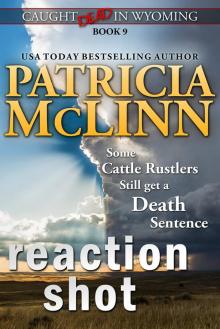 Reaction Shot (Caught Dead in Wyoming, Book 9)
Reaction Shot (Caught Dead in Wyoming, Book 9) Warm Front
Warm Front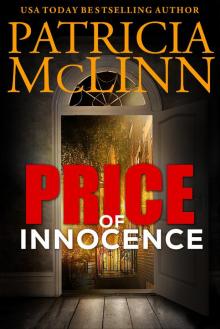 Price of Innocence
Price of Innocence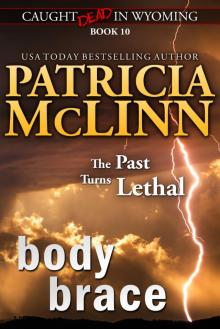 Body Brace (Caught Dead in Wyoming, Book 10)
Body Brace (Caught Dead in Wyoming, Book 10)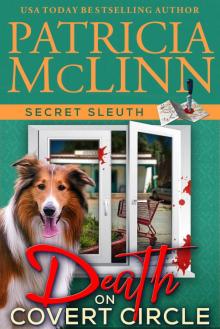 Death on Covert Circle
Death on Covert Circle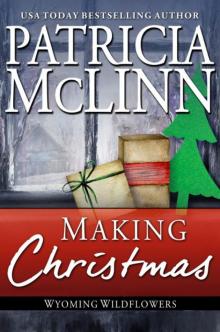 Making Christmas
Making Christmas Death on Torrid Ave.
Death on Torrid Ave.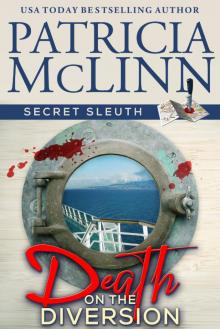 Death on the Diversion
Death on the Diversion The Rancher Meets His Match
The Rancher Meets His Match Widow Woman
Widow Woman The Runaway Bride
The Runaway Bride Hoops
Hoops A Stranger in the Family (Book 1, Bardville, Wyoming Trilogy)
A Stranger in the Family (Book 1, Bardville, Wyoming Trilogy)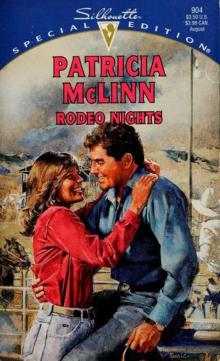 Rodeo Nights
Rodeo Nights Wedding Series Boxed Set (3 Books in 1) (The Wedding Series)
Wedding Series Boxed Set (3 Books in 1) (The Wedding Series)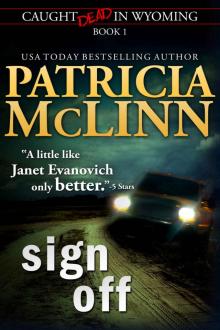 Sign Off (Caught Dead in Wyoming, Book 1)
Sign Off (Caught Dead in Wyoming, Book 1) Prelude to a Wedding
Prelude to a Wedding MATCH MADE IN WYOMING
MATCH MADE IN WYOMING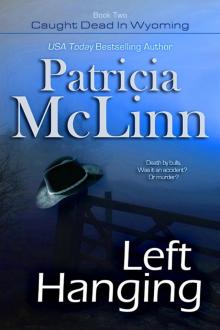 Left Hanging
Left Hanging What Are Friends For?
What Are Friends For?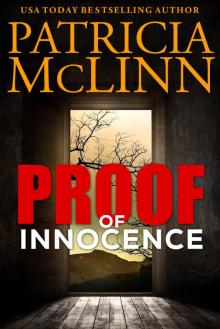 Proof of Innocence
Proof of Innocence Hidden in a Heartbeat (A Place Called Home, Book 3)
Hidden in a Heartbeat (A Place Called Home, Book 3) Baby Blues and Wedding Bells
Baby Blues and Wedding Bells Least Likely Wedding?
Least Likely Wedding? Heart Stealers
Heart Stealers Grady's Wedding
Grady's Wedding Right Brother
Right Brother Wedding of the Century
Wedding of the Century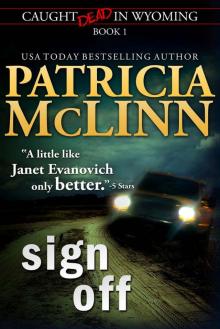 Sign Off
Sign Off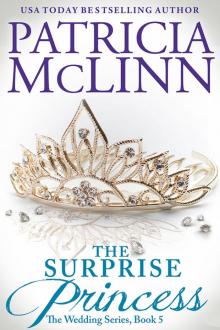 The Surprise Princess
The Surprise Princess Wyoming Wildflowers: The Beginning
Wyoming Wildflowers: The Beginning